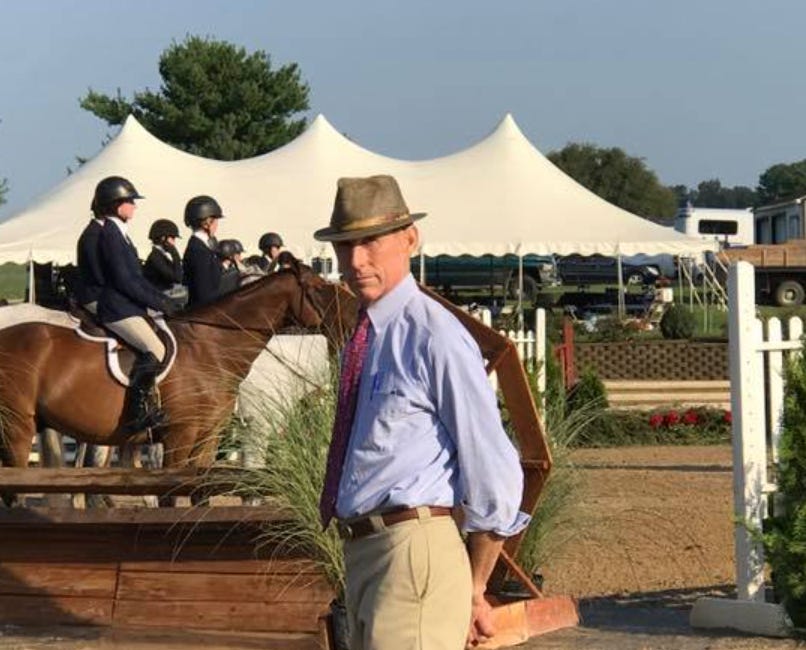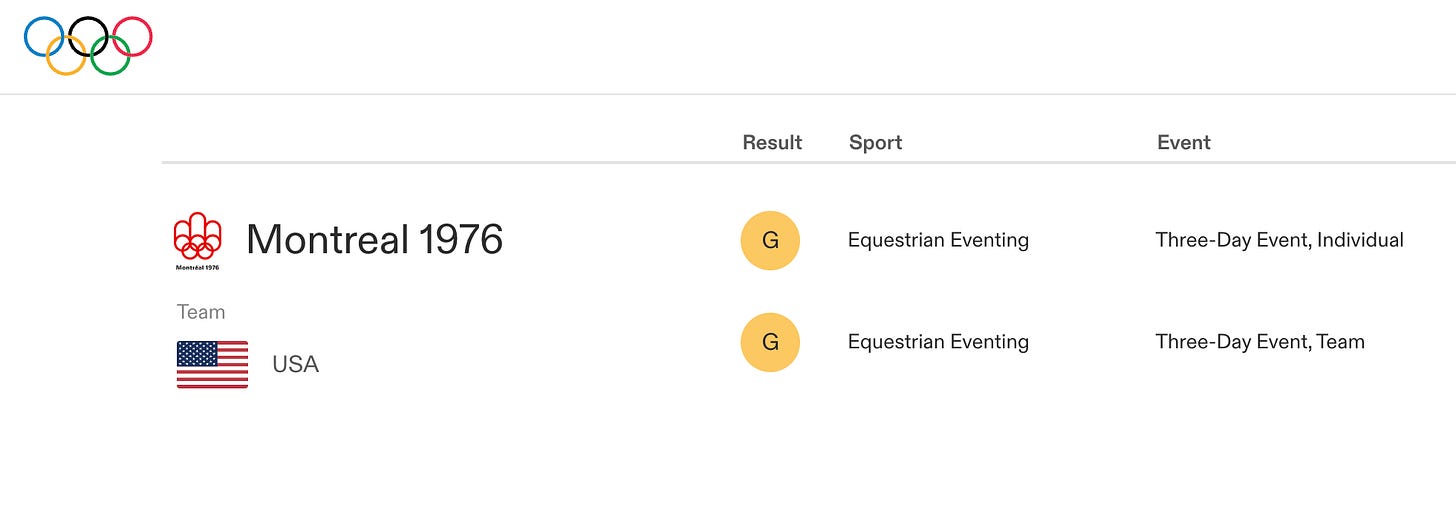A Grateful Olympic Nod to the Divine
By Tad Coffin
Below is an essay by Tad Coffin, winner of two gold medals in the 1976 Montreal Olympics, for the individual and team Olympic Equestrian Three-Day Event.
The inclusion of a drag queen parody of the Last Supper in the Olympic Opening Ceremony has deeply offended many Christians and non-Christians alike, including myself.
As a Christian and as an Olympic athlete (1976 Montreal Olympics, equestrian), I am stunned and mystified by the decision to alienate such a large portion of the world's population while claiming inclusiveness and appealing to the avant-garde nature of French culture.
I am deeply disappointed by the French Olympic Committee's profound failure to provide reasonable guidance regarding the narrative and scripting of this Ceremony.
Therefore, I'll join the chorus of those who criticize the committee for its remarkably poor judgment.
It may be a useful thought experiment to consider how the purpose of this Ceremony might be re-imagined. In this way, it may be easier to judge the flawed thinking behind this theatrical catastrophe and contrast it to what might have been or should have been.
It is right and just that the Opening Ceremony should celebrate the athletes and their array of talents to marvel at the assembly of so many from the far reaches of the globe, their peaceful competition in such wide-ranging events, and share in their stories, hopes and dreams for athletic glory.
Similarly, the host nation of the Olympic Games has a unique and well-earned opportunity to showcase its own rich history, culture, and traditions. That is also how it should be.
Where do the gifts of athleticism, hard work, and perseverance come from? I have a talent for riding but certainly don't remember submitting a prenatal request for such abilities. While some characteristics are inherited, everyone knows that parentage hardly guarantees athletic greatness. For instance, my siblings have many other gifts but are not Olympic-caliber riders.
Being grateful to God Almighty for these abilities is not unreasonable. Certainly, there is ample precedent for seeing evidence of God's hand throughout human history. It's not necessary that everyone agree, but having the humility to recognize that it's not all of one's own doing is, at the very least, more appealing than publicly celebrating narcissism and trolling people of faith.
Therefore, it seems appropriate that a gathering of many of the world’s best athletes should at least include a grateful nod to the Divine.
What about the land we ride on, bike, run, jump, and train on? What of the water that we swim in, surf on, sail, and kayak through? The earth that we rely on for our very health and well-being? Is this world not possibly an act of Creation by a Creator? Should we just assume that this world, this universe appeared out of nothing and that we're so clever, putting it to such good use? Really? Again, it's certainly not unreasonable to be at least grateful for its existence. For millennia, many have sought to praise the Creator for his handy work.
And what has made the French French? My education as a rider is an inheritance from the famed Cadre Noir, the elite corps of Napoleon's grand cavalry. Its pursuit has been perfecting man's partnership with perhaps God's greatest and noblest gift, the horse.
The long, unique, and storied history of the French has most certainly not been built on the machinations of drag queens. Unless my reading of history is all wrong, France's theological underpinnings have anchored its national culture. To dispute this, to demean its importance while simultaneously elevating some grotesque parody of a unique moment of historical and religious significance, is to be enthralled with nothing short of the demonic.
Let's return to a simpler, authentic celebration of what's in front of us: the elevation of remarkable athletes hosted by a remarkable nation. May our future ceremonies extend recognition and gratitude both horizontally to our fellow man and vertically to the transcendent God.
Tad’s farm is just down the road from ours and over the past four years, we have become close friends. Tad, his wife Kelly, Jill and I often meet for dinner at their place or ours. Tad always dresses for the occasion, with a slacks, tweed jacket and fedora hat
.Tad’s farm is a lot like ours, except they have a lot of ducks, and one great big tortoise, named “Bob.” Like our farm, their farm complex is the center of a hub of creativity. In Tad’s case, he has a stable of his own personal horses that he rides daily, as he has the lofty goal of re-imagining the saddle, and his horses are his testing board for his new designs. Some of these horses have been with him for decades, as he has a commitment to every single one that extends throughout their lives.
There is a grace that resides deep within Tad’s soul; one that resonates deeply with people and animals alike. A calm stillness in his thought and deed, that springs forth from his deep relationship to God and the divine.
His wife Kelly likes to tell the story that after the Olympics, he gave one gold medal to his parents and the other, to his coach, Jack le Goff. Humble selflessness.
About Tad:
Tad Coffin was the first American to win the individual Olympic Three Day Event title in 1976, and he also won a gold for his team participation in the three day event. On his Olympic horse, Bally-Cor, he had previously won the individual competition at the 1975 Pan American Games and led the U.S. to victory in the team event.
The U.S. Hunter Jumper Association, the nation's top equestrian group, named its youth championship in the Mid-Atlantic states in his honor - which is called the Tad Coffin Zone III Equitation Final. His horse, Bally Cor, was inducted in the U.S. Eventing Association Hall of Fame in 2003.
A descendant of the founder of the W. & J. Sloane furniture store, he is a nephew of the peace activist William Sloane Coffin and a distant cousin to the former United States Secretary of State Cyrus Vance.
Tad is an engineer by training, who founded a successful saddle-making business, where he has redesigned the saddle from first principles - using a combination of ancient and new ideas and technologies.
I am truly honored to have the privilege of Tad’s friendship.
After the Montreal Olympics:
Tad won Team bronze on Bally Cor with the USA at the 1978 Eventing World Championships in Lexington, but by 1980 – when he was just 25 – he was no longer competing.
Just like his mentor Jack before him, he chose to dedicate himself to teaching and innovation within equestrian. Since the late 1980s he has led Tad Coffin Saddles in Virginia, looking to enhance the most important part of a rider’s equipment.
“I don’t have any regrets about my decision,” he says. “It’s a remarkable thing to have multiple successes, but that wasn’t of interest to me.
I saw coaching as of more enduring and greater importance than riding itself. For me, to put something back into sport was to teach and since then -- for the last three decades -- to develop technology to improve saddles.
Quite simply, I was interested in taking a piece of equipment that has not really evolved for decades and centuries, but is so integral. It is the interface where two complex machines – human and horse - meet.
We’ve made upwards of 4,500 experiments – more tests than ever in the history of saddle-making. I’ve always been the rider in the saddle during experiments so I’ve kept my weight exactly the same as it was in 1976! It has been my second Olympic effort, you might say.






Beautiful essay
How to repond to this Olympic outrage? My wife vowed not to watch the events at all. She believes that the Christian athlete should protest by refusing to compete after years of sacrifice and training. Boycott French products? Leave France off the travel itinerary? I have a different take. Now the LGBTQ+ crowd (Q+ for short, there are just too many letters to keep track of) has made their claim. They are, in fact, now unquestionably, a religion, and as such, must be subject to all of the church/state restrictions and prohibitions that impact any other expressions of faith in the United States.